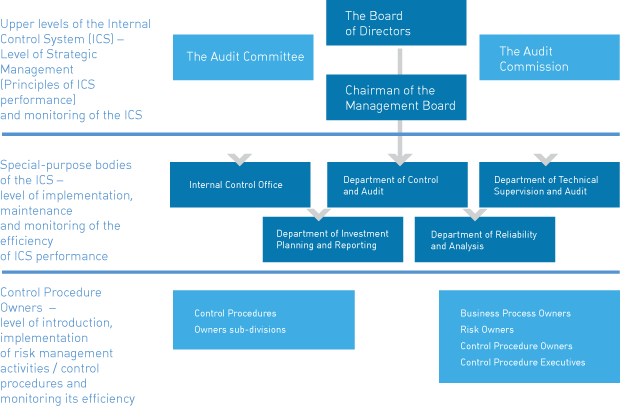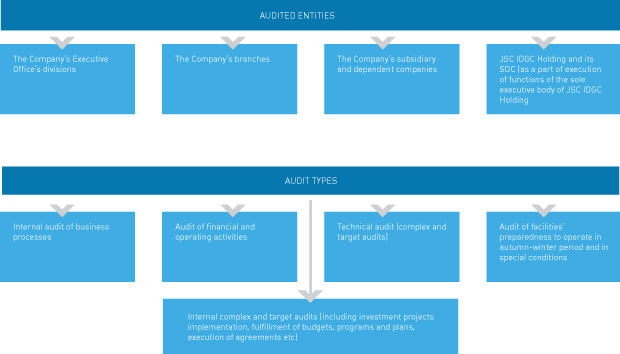The Internal Control System
The Company’s internal control system is focused on detecting and mitigating the risk of events that may adversely affect the Company’s ability to achieve set objectives and which will lead to losses; at safeguarding assets and efficiently utilizing resources; and at ensuring compliance with Russian legislation, the decisions of the management bodies and internal corporate documents.
The Internal Control System Chart

The Audit Commission
The Audit Commission is elected annually by the General Meeting of Shareholders to control the Company’s financial and business operations.
The Audit Commission’s terms of competence cover:
- Confirming the credibility of statistics in the annual report, the accounting balance sheet and the Company’s profit and loss statement;
- Analyzing the Company’s financial status, identifying reserves to upgrade the financial position and elaborating on recommendations for management bodies;
- Verifying (audits) of the Company’s financial and business operations.
The current composition of the Audit Commission, elected at the annual General Meeting of Shareholders on 29 June 2012 (the positions are indicated as of the election date):
- Anna Drokovà
Deputy Head of the Department of fuel-and-energy and coal industry enterprises of the Federal Agency on State Property Management; - Andrey Kolyada
Head of the Department of fuel-and-energy and coal industry enterprises at the Division of Infrastructure Sectors and military-industrial enterprises of the Federal Agency on State Property Management; - Victor Lebedev
Assistant to the Deputy Prime Minister of the Government of the Russian Federation; - Vladimir Raspopov
Chairman of the Commission;
Deputy Head of a Division of the Federal Agency on State Property Management; - Maria Tikhonova
Member of the Board of Directors in numerous companies.
Audit Commission members hold no shares in the Company.
Auditor
To conduct the compulsory audit of the Company’s accounting statements, the General Meeting of Shareholders approves the Auditor.
The Annual General Meeting of the Shareholders on 29 June 2012 approved the candidacy of LLC “RSM Top-Audit”, as suggested by the Board of Directors. The Auditor is a full member of RSM International (RSM) and a member of the self-regulatory organization of auditors, the Non-Profit Partnership “Russian Chamber of Auditors”.
The selection of the Auditor was made among organizations licensed to conduct a general audit, which are not connected with the Company via property interests, and which are non-affiliated with the Company and/or with its affiliates, and was based on a tender procedure, which took into account the Auditor’s professional competence and the service cost.
Moreover, according to the terms of the dealer agreement in respect to the bond issue program concluded by JSC Federal Grid Company and Federal Grid Finance Limited, one of the following companies – PriceWaterhouseCoopers, Ernst & Young, Deloitte, KPMG – or one of its affiliates shall be appointed as an auditor for Federal Grid Company’s IFRS consolidated financial statements.
According to this requirement, PriceWaterhouseCoopers CJSC was appointed as the auditor for Federal Grid Company’s consolidated financial statements for 2012, which were prepared in compliance with IFRS (as adopted in the EU).
The Company’s Internal Control Units
In 2012, the Company passed a new edition of Regulations on the Internal Control System and approved a draft of the Strategy (Concept) of Internal Control System Improvement, which will be implemented in 2013-2014. In addition, the Company paid attention to the development of the Internal Control System in subsidiaries and dependent companies (SDCs), where a process of upgrading risk management, internal control and audits has been started.
The following are key objectives of upgrading the Internal Control System:
- Integrating the Internal Control System and risk management into a single management system for the prevention, timely detection and prompt responses to risks and threats;
- Building effective working business processes unified throughout the entire command chain, including the minimum necessary control procedures, which are developed considering implementation costs and its effectiveness;
- Introducing a risk-oriented internal audit, also stipulating the planning of inspection procedures based on risk assessment – to focus on the most vulnerable facilities and activity sectors.
Within the framework of the Internal Control Systems, the following types of control are carried out:
Preliminary (Preventive) Control
The prevention of ineffective (unreasonable) and illegal activities is performed by Special-Purpose Control Bodies and Structural Units of the Company in a process of optimizing and regulating business processes, and by the Internal Control Office and Structural Units of the Company through risk detection and assessment.
Current Control
The timely detection and immediate removal of shortcomings is performed by Special-Purpose Control Bodies and Structural Units of the Company, by fulfilling control functions within the framework of their key responsibilities.
Follow-up Control
The detection of shortcomings and violations in terms of the Company's financial, economic and production operations is performed by the Department of Control and Audit, the Department of Technical Supervision and the Audit Committee.
Internal Control System development is performed by the following sub-divisions:
- The Internal Control Commission;
- The Internal Control Office;
- The Reliability and Analysis Unit of the Production Control Department;
- The Department of Technical Supervision and Audit;
- The Department of Investment Planning and Reporting;
In addition, in the Company, an Internal Control Commission operates – this is a collegial body whose task is to review materials and audit results carried out by supervisory departments of the Company and external control (supervision) authorities, and to develop a coordinated position and proposals to eliminate violations and identify shortcomings.
During 2012, specialized internal control agencies conducted 120 inspections.

Based on the results of control measures, corrective actions have been developed and are being implemented to address revealed shortcomings and their resulting consequences, and to improve the reliability and failure-free operation of the UNEG, as well as to implement preventive measures to reduce the risk of inefficiency for Federal Grid Company.
Remuneration to Members of the Control Units
The Audit Commission
The General Meeting of Shareholders approved the Regulations on the payment of remuneration and compensation to members of the Audit Commission of JSC Federal Grid Company (Meeting Minutes # 5 as of 4 July 2008). The above-mentioned Regulations do not provide for compulsory payments to members of the Audit Commission. In 2012, remuneration was not paid to members of the Audit Commission.
The Auditor
To audit the Company’s accounting statements (based on Russian Accounting Standards (RAS)), the Auditor's 2012 fee is approved by the Board of Directors in an amount not to exceed RUR25 Million, including VAT.
